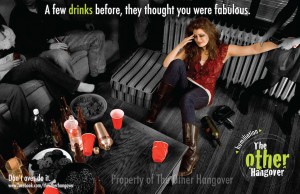Everyone knows what a hangover feels like. The parched mouth, aching muscles, and splitting headache are all unfortunate consequences of a hard night of drinking. “The Other Hangover” is less easily explained. It sometimes starts with a sinking feeling in the pit of your stomach. You wake up and realize that something is wrong, but you can’t remember what it is. Slowly, flashes of what you did the night before begin to play in your head. Maybe you got in a fight; maybe you danced topless on the bar. Whatever it was, you begin to realize that your overindulgence the night before may have cost you a lot more than your bar tab.
This is what’s known as “The Other Hangover.” It’s the embarrassment, guilt, or shame you feel due to the dumb decisions you made under the influence of alcohol.
The Other Hangover: Anti-Drinking Campaign
“The Other Hangover” is a concept developed by University of Minnesota undergrads. This semester, the campus has been plastered with posters and ads that try to convince students not to overdo it at the bar.
The idea came from a group of advertising students tasked with creating a responsible-drinking campaign for a national competition last year. The students surveyed their peers and found that the threat of most negative consequences (DUI, alcohol poisoning, and death) was not enough to scare them into drinking responsibly.
The ads feature things like women dancing provocatively at a bar with the caption “Reputations Aren’t Drunk Proof” and a guy with an arm around a girl and the other hand holding a drink which read “Before you got wasted, you weren’t known as ‘The Creep’”.
Some have praised The Other Hangover Campaign for relating to college students on a level they understand. Since young people tend to think they are invincible, traditional campaigns focused on the dangers of drinking don’t seem to do much good.
Critics of the campaign call it “drunk shaming” and say that it reinforces sexist stereotypes (i.e. if you are a woman and you make out with a guy at a bar, you’re a slut.) The message, they say, is don’t get to drunk, or you’ll do something stupid and everyone will hate you. They claim that there are better and more effective ways to teach college kids responsible drinking.
However, maybe the ad will work where others have failed. It is no secret that campaigns like “The Faces of Meth,” which show the physical deterioration of people who have been arrested for multiple charges of possession, has been more effective on teenagers than more traditional campaigns. Some think this is because it shows teens something that they actually care about – i.e. the erosion of their physical appearance, rather than something that they think could never happen to them-i.e. car crashes or overdoses. Similarly, The Other Hangover ads play on the social consequences of drinking rather than the physical or legal consequences. According to its creators, it targets the things that young people “truly care about.”
http://www.theotherhangover.com/
http://jezebel.com/the-other-hangover/


